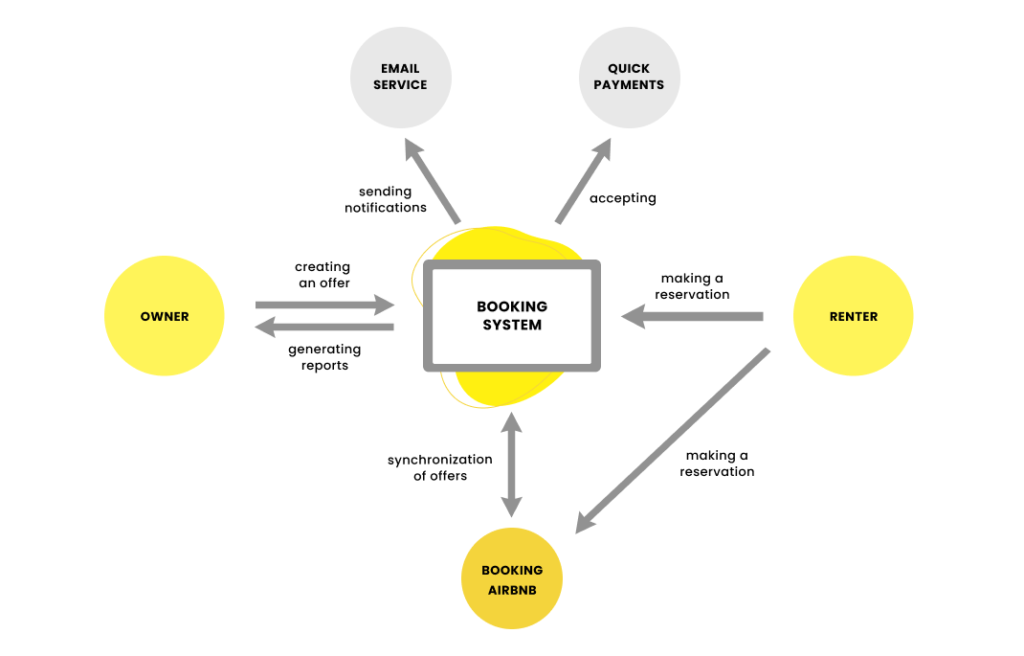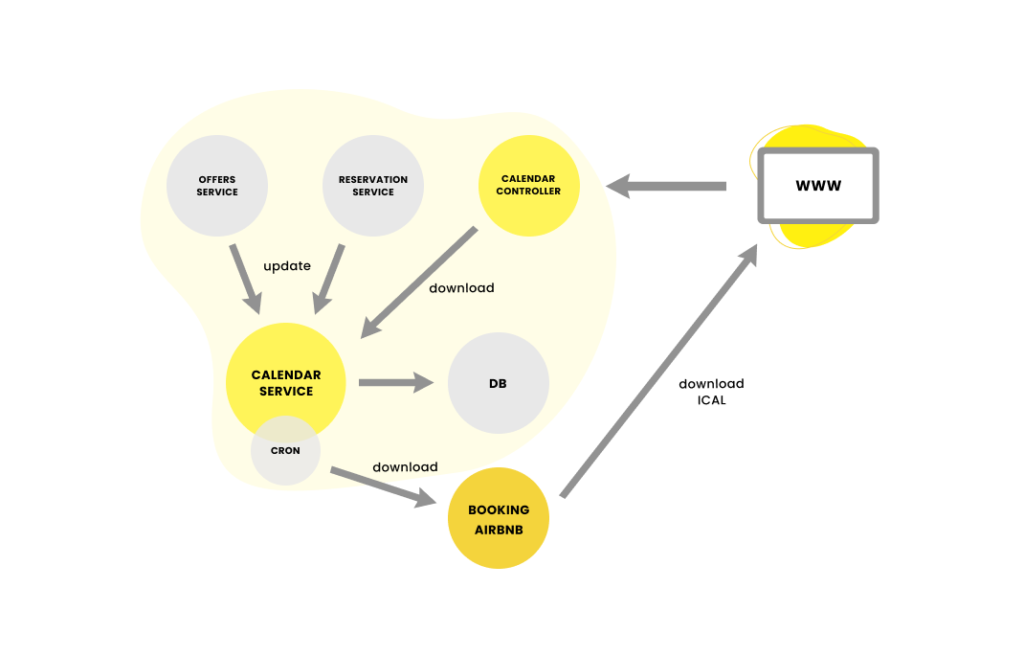In today’s fast-paced world, property owners and travelers alike require efficient and user-friendly booking systems. This article will explore the development of an responsive booking system that streamlines the booking process and synchronizes offers with popular booking apps like Booking.com and Airbnb. We will cover the topic taking up the technical, as well as business approach.
In today’s fast-paced world, property owners and travelers alike require efficient and user-friendly booking systems. This article will explore the development of an IT booking system that streamlines the booking process and synchronizes offers with popular booking apps like Booking.com and Airbnb. We will cover the topic taking up the technical, as well as business approach.
Table of Contents
You’ll find out:
- Factors property owners should pay attention to before having a dedicated booking system developed,
- The most important features every booking system should be equipped with,
- How to create an efficient booking system from scratch,
- How to make the most out of a booking system for your property management business?
- The importance of mobile applications (aplikacja) in managing bookings and enhancing user experience.
All the ideas we present in this article result from our inner company workshops on designing IT system architecture. Using Event Storming techniques, our teams were able to capture the dynamics of user behaviour in the system under thorough analysis. As a result, our team has planned the project of the booking system’s infrastructure, following the brief’s guidelines.
Introduction
A reservation system is a crucial element in the hospitality and tourism industry. It enables efficient booking management, increases online reservations, and enhances customer service. With a well-designed reservation system, property owners can automate numerous processes, saving time and resources. These systems also allow for synchronization with popular booking platforms such as Booking.com and Airbnb, increasing visibility and availability of offers.
Choosing the right reservation system is key to the success of any accommodation business. It’s important to focus on features essential for booking management, such as integration with other platforms, data security, payment processing, and the system’s adaptability and scalability. In this article, we will outline the key features and benefits of reservation systems and provide guidance on selecting the right system for your hotel or guesthouse.
What to consider before developing a booking system?
Before developing a dedicated booking system, you should consider what features are essential to address your target users’ needs and pain points. It’s good to take into consideration:
- User experience (UX) and user interface (UI) design
Develop a user-friendly, intuitive, and visually appealing interface that makes it easy for property owners and guests to use your booking system.
- Customizability and scalability
Ensure the system can be easily customized to suit individual property owners’ requirements and preferences. It should also be scalable to accommodate future growth and expansion.
- Integration with other platforms
Consider integrating your booking system with popular platforms like Booking.com and Airbnb to allow property owners to manage their listings and bookings from a single platform.
- Integration of various services (usługi)
Integrate different usługi to enhance the booking system’s functionality, such as systems that reduce online booking fees and attract more direct bookings. These services can be tailored to meet the needs of hotels and streamline the booking process.
- Security and data privacy
Implement robust security measures to protect user data and ensure compliance with relevant data protection regulations, such as the GDPR.
- Payment processing
Integrate a reliable payment processing system that supports multiple payment methods and currencies to facilitate transactions between property owners and guests.
Use Cases
Developing a fully-fledged IT system from scratch requires designing well-defined scenarios of usage.** Our booking system streamlines the fundamental processes:
- Property owners can easily add a new booking offer to the system, which then displays on the dedicated website.
- Users can browse the website, select an attractive offer, and easily book their stay, including selecting a payment method and completing transaction steps.
What core features should a booking system have?
The fully-fledged booking system should be equipped with the core features to ensure a seamless experience for property owners and their guests. Thus, it’s good to ensure that your booking system offers a range of innovative features, such as:
- An administration panel for managing facilities, communicating with backend services via API,
- Frontend development that allows for image uploading and conversion to the appropriate format (e.g. webps),
- External authorization systems (e.g. firebase) to accelerate performance,
- Backend communication set up as a proxy, which ensures secure, efficient, and reliable data exchange between the frontend and backend servers,
- Support for mobile applications (aplikacji) to enhance user experience and management.

Designing a Responsive Interface
Designing a responsive interface is a crucial aspect of creating a reservation system. The interface should be user-friendly, intuitive, and tailored to meet the needs of its users. In today’s world, users access systems from various devices such as smartphones, tablets, and computers, making it essential for the reservation system’s interface to be responsive and adaptable to different screen sizes.
To achieve this, consider the following solutions:
- Use of Responsive Design: Create an interface that automatically adjusts to various screen sizes and devices, ensuring a consistent and convenient user experience.
- Simple and Clear Interface: Design a straightforward interface that is easy to navigate and enables quick and hassle-free booking. Users should be able to find the necessary information and make reservations without unnecessary complications.
- Incorporate Icons and Graphics: Utilize icons and visuals that facilitate navigation and enhance the user experience. Visual elements can help users quickly understand available functions and options in the system.
- Adapt the Interface to User Needs: Consider the needs of different user groups, including individuals with disabilities. Ensure accessibility by applying appropriate color contrasts, large fonts, and easily clickable elements.
Designing a responsive interface is not just about aesthetics but also about functionality and usability. A well-designed interface can significantly improve the user experience and increase the number of bookings made through the system.
Developing an efficient booking system step by step
Developing an efficient booking system requires careful planning, design, and execution. Follow these steps to create a successful platform:
To enhance the user experience within the booking system, it is essential to provide the ability to change various settings and options. This includes modifying user permissions, selecting dates for scheduling calendars, adjusting reservation statuses, and updating theme settings. By allowing users to change these settings, you can offer a more customizable and user-friendly platform.
1. Ensure synchronization
The properly developed booking system enables synchronization. Synchronization is crucial in every booking system to prevent double bookings across multiple channels if you have active offers on popular apps, such as Booking.com, and Airbnb.
Our tip:
You can enable synchronization for instance via iCal calendar files, which are linked to the offer calendars on Booking and Airbnb, ensuring that the availability of your offer is always up-to-date.
2. Enable integration with external systems
Integrate necessary third-party services to enhance the functionality of your booking system. The dedicated booking system should allow for integration with various external systems, such as:
- Payment providers for secure and efficient transactions,
- Mailing services for sending booking confirmations and notifications,
- Authorization systems to ensure secure access and streamlined processes.
3. Have a fully-fledged backend
Designing the backend architecture to be scalable ensures that it can handle increasing loads and demands as the booking system grows. This can be achieved through horizontal and vertical scaling, containerization, and other architectural patterns. The backend development includes creating main modules within the booking system, such as:
- Facilities module for managing property attributes and uploading images through file storage integration,
- Offers module for creating and managing booking offers,
- Reservations module connected to the payment module in the database,
- File storage module for handling uploaded images and documents,
- Authorization module for secure access control,
- Integration modules for third-party systems,
- Notification system component for sending reservation information via email,
- Reporting module for providing valuable feedback on your offers.
By considering these factors when setting up a proxy for backend communication in a booking system, you can ensure efficient, reliable, and secure data exchange between the frontend and backend servers.

Our tip:
Setting up REST API as the primary connection between modules will contribute to your booking system’s efficiency, scalability, and maintainability. REST APIs are easy to integrate with other systems, making it simple to connect your booking system to external services like payment gateways, calendar synchronization tools, or analytics platforms.
4. Don’t forget about security
Ensure that your booking system adheres to best security practices, including data encryption, secure authentication, and authorization mechanisms. Be mindful of compliance with data protection regulations like GDPR.
- Set up authentication and authorization
Implementing authentication mechanisms such as OAuth, JWT (JSON Web Tokens), or API keys ensures that only authorized users and applications can access the backend server. Additionally, role-based access control can help restrict user access to specific resources and actions.
- Secure communication
Using HTTPS with SSL/TLS encryption secures the data exchange between the frontend and backend servers. This prevents data tampering and eavesdropping during transit.
Dedicated booking system: Is it worth it?
Whether or not a dedicated booking system is worth it for property owners depends on several factors, including the size of the property portfolio, business objectives, and desired level of control.
Pros:
- Increased control over bookings and customer data.
- Potential for higher profit margins by avoiding third-party fees.
- Enhanced brand recognition and customer loyalty.
- Ability to manage direct bookings to reduce costs associated with intermediaries.
Cons:
- Potentially higher customer service demands.
- Initial setup and ongoing maintenance costs.
- Requires marketing efforts to drive traffic to the booking site.
Pros:
- Control and customization
A dedicated booking system gives property owners more control over their booking processes, policies, and customer interactions. They can customize the system to align with their brand and cater to their specific needs.
- Direct bookings
A dedicated booking system allows property owners to accept direct bookings through their website, potentially reducing reliance on third-party platforms and associated fees.
- Enhanced guest experience
Property owners can offer a seamless booking experience tailored to their guests’ needs with a dedicated booking system. They can also provide personalized offers, promotions, and upsells that may not be possible through third-party platforms.
- Data ownership and insights
Property owners have complete ownership of their booking data when using a dedicated system, enabling them to gain valuable insights into guest preferences, booking patterns, and revenue performance. This data can be used to optimize pricing strategies, marketing efforts, and overall guest experience.
- Integration with other systems
A dedicated booking system can be more easily integrated with other business tools like property management systems, customer relationship management (CRM) platforms, or marketing automation software.
The dedicated booking system will offer numerous advantages for your guests, including:
- A user-friendly booking process,
- Real-time availability and pricing information,
- Secure payment processing and data protection,
- Integration with popular booking platforms for increased visibility and convenience.
Cons:
- Costs
Developing, implementing, and maintaining a dedicated booking system can be costly, especially for smaller property owners with limited resources.
- Time and effort
Building and managing a dedicated booking system can be time-consuming and require technical expertise, potentially diverting resources from other aspects of the property management business.
- Marketing and promotion
Property owners may need to invest in marketing efforts to drive traffic and bookings to their dedicated system, as they may not benefit from third-party platforms’ visibility and customer base.
- Competition with major platforms
Property owners with a dedicated booking system may still need to compete with popular platforms like Airbnb and Booking.com, which have significant marketing budgets and large customer bases.
- Regular updates and maintenance
A dedicated booking system will require regular updates, security patches, and maintenance to ensure it remains functional, secure, and up-to-date.
Here are some tips that will help you to maximize the potential of your booking system:
- Regularly update your facility offers and their availability on the system,
- Use high-quality images and detailed descriptions of your properties,
- Set competitive pricing and offer flexible cancellation policies,
- Monitor and respond to customer reviews to attract more bookings,
- Upgrade your system with new features to remain competitive and relevant to users’ needs.
Conclusion
The development of an innovative IT booking system offers property owners and travelers a streamlined and efficient booking experience while also providing a range of advanced features and integrations to enhance usability and effectiveness. By implementing the right strategies and technologies, property owners can harness the full potential of the booking system and ensure a successful and profitable business. In conclusion, a dedicated booking system can be worth it for property owners who want more control, customization, and direct bookings.
If you need any advice on developing software for the property management industry, get in touch with us. If you want to discover more technology-related topics, visit our blog.



